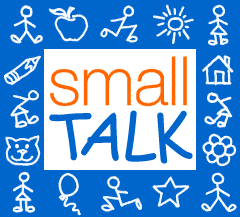How Babies Learn To Talk
A baby learns to talk by listening to voices and sounds. Your baby makes sounds to tell you how he/she feels or what he/she wants. Babies develop at their own rate. Some babies do things at a young age and some take a little longer.
Very young babies (up to 3 months old) will
- make noises (eg., coos, gurgles)
- turn towards a new sound
- jump at a loud noise
- be calmed when you speak in a gentle voice
- smile at you
By 6 months, most babies will
- watch your face when you talk
- cry in a different way when hungry
- make noises to get attention
- make sounds back when you talk
- smile at you and other family members
How YOU can help your baby’s speech and language grow
- talk to your baby - talk about what you are doing when you are washing, dressing or feeding him/her
- use your baby's name when talking to him/her
- touch your baby
- repeat the sounds your baby makes
- face your baby when you talk to him/her
- do things that make your baby smile and laugh
- show your baby different sounds and talk about them (examples - play a music box, make animal sounds, crumple a paper bag)
- speak or make gentle sounds when your baby touches you, looks at you or makes sounds
- show your baby picture books and talk about what you see
- use lots of facial expressions when you are talking to your baby
- sing songs or nursery rhymes
- play simple games like "peek-a-boo"
WHEN TO CALL FOR HELP
- Your baby does not react to your voice or other sounds.
- Your baby does not smile or make sounds when awake.
- You have questions or concerns about the way your child’s speech and language skills are developing.
- You want to refer your child for a speech and language assessment.
- You want more information on other topics related to speech and language development.

